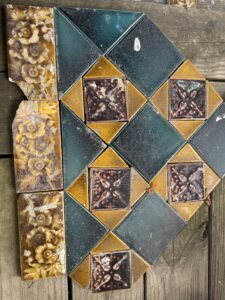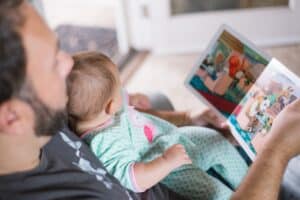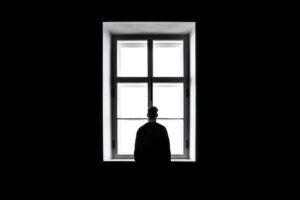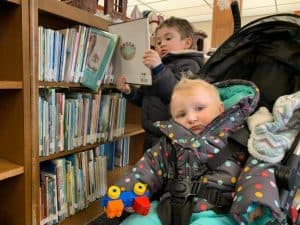“What continent do we live on?” I heard the special education teacher asking in the next room.
“Indiana!” A teenage voice cried triumphantly.
I’m sitting in the classroom kitchen, while my patient participates in her class.
“That’s our state, and we live in the United States,” the teacher explains slowly, patiently. “But our continent is North America.”
And suddenly, I think, I know just how that boy feels.
I know what it’s like to be confused about where I am.
I know what it’s like to be asked a simple question and not have the mental clarity to answer. I know what it’s like to look around at the other people who seem so normal, and realize that they are trying to be patient with me.
The word depression is fraught with so much history, it almost feels dangerous to use it. I’m not a neuroscientist or a counselor or therapist. I don’t think I’ve had the worst kind of depression. To those who have experienced that, you might not want to read on, because likely my thoughts will not apply.
My experiences, which I have battled periodically, are more like struggling to understand -figuratively- which continent I am on. This fall was a classic example.
I’m not up to writing a treatise on depression and its causes. I just plan to share a few interventions over the course of the next Saturdays, that I personally have found to help with the mental fog. They aren’t in a particular order, and they aren’t scientific. I’ve already mentioned “Daily Acts of Kindness” last week. This next one might seem ridiculous to you, but it’s huge to me.
Reading Books
Likely one reason that reading soothes me is that it takes me back to my childhood. My parents read Scripture and chapter books aloud to us in the evenings. But I haven’t always read much. I’ve often treated reading books as an extra thing to do if I have everything else done. Or a luxury for an annual trip to the lake. Now, I’ve concluded that reading a lot is important to my mental health.
Why?
I’ve probably read a dozen books so far this year, and that is high for me. I also read more last fall, even while the boys were with us, than I normally do. Here are a few of the ways I believe reading impacts our lives for the better.
- Books shrink our own problems and force us to look outward. Suddenly, I’m back in 1962 where nuclear bombs threatened to blow civilization off the map. Or I’m with the “Boy Who Harnessed the Wind” in Africa as the population starves and water is carried a long distance. Or I’m outside London, homeless and desperate, with David Copperfield. And then, I realize things about myself. I have never taken part in a nuclear fallout drill. I have never been homeless. Never, in 37 years of living, have I needed to ration either food or water, unless I count Mom telling us we can only have two cookies.
- While books often deal with horrible, confusing, or insurmountable situations, they usually end in hope. Stories can help us see that most hard times are seasonal. Chapters end. Even the Holocaust -something that can almost keep me up at night if I dwell on it- ended. It took the lives of so many people that it is hard to fathom. But it did end.
- Book time is superior to screen time or social media, for those who do them all. I’m not sure what the difference is scientifically, but I personally would not recommend video to help with depression. I think screens tend to dull the mind rather than restoring it. The mind doesn’t have to work, other than to try to keep up. When you read a book, your mind must interact. It must see, smell, hear, taste, and touch. The story plays inside your head, not in front of your eyes. Your mind, though directed by the words, controls the action.
Are there books that can make a person more depressed than they are? Without doubt. We just read Wuthering Heights by Emily Bronte. As you know if you’ve read it, it’s gloomy. Even then, it reminded me of how lovely my own life is. But there are so many good books in the world, it’s impossible to exhaust the worthwhile options.
Practical Ways To Read
Here are a few of the ways I’ve been reading:
- Reading aloud in the evenings. Even when the boys were in the house and we were living on the edge, reading helped me survive. Marnell read a devotional every night, and then I read a continued story. We read several chapter books and listened to audiobooks on trips. Of course, they brought with them their own challenges since the worth of books to the boys depended on the inclusion of ghosts, witches, bloodshed, and other such amiable content. But in the end, the boys often found themselves even interested in the “boring” books. In these books, I think we may have had our best connections. All four of us, plunged together into the same setting and plot, where we could accumulate common experiences.
- Audio books while doing manual labor. Our library uses an app called Hoopla where you can get up to six (I think?) audio books per month, free. When I’m tempted to think too much about myself, listening to an audio book while cooking or doing laundry or driving can transform my perspective. Also, getting educated while doing mindless tasks helps me feel efficient.
- A reading challenge. Now, in January and February, I’ve taken up the Daughters of Promise Brighter Winter reading challenge. I tried to complete as many challenges as I could, and even got to take my little friends Jaxson and Brielle to the library. I just realized that the program ends on February 28th, so unless you are super speedy you probably won’t get a lot of books finished by the end. But you might want to check it out anyway on your own. Or, you can make up your own challenge. My friend Cris shared hers as a guest post on Shari Zook’s blog, here. Shari also has a blog entitled “Making time for books in the mommy years.“
- Having a “library” in your house. Budget a little money for books each month. Get books at the library. Build bookcases, and pass books on that you don’t want to keep. I’ve christened the second room of our house “The Library”, and I love that room!
That boy that complained about the boring books and even shut his ears once? The boys came back the other day to pick up the remainder of their stuff. I told them that they had started us on the reading tradition and that we still read books most evenings.
There was a short silence.
Then he said, “That kind of makes me want to come and spend the night again and hear a story.”






12 thoughts on “Promoting Mental Wellness: Reading Good Books”
Here is a book suggestion for you: “I Promise I Will Always Write Back.” by Caitlin Alifirenka, Martin Ganda, and Liz Welch. It’s the true story of penpals, both fourteen years old, who began to correspond in the early 1990s. One is from a wealthy family while the other lives in grinding poverty, and each penpal learns a great deal about the world through the friendship. Although parts of the story are sad, there is a hopeful, upbeat ending. It’s not a Christian book, as I hoped, but one of the penpals has at least some familiarity with God.
To build a home library, I like thrift shops, charity book sales, yard/tag/garage sales, library book sales, and Freecycle.org. There are also the standard used-book shops, online used-book sites, and paperback-swapping sites. There are probably many other sites, too, which I never heard of.
I am sorry about your depression. I like funny books when I have difficult times. I also try to remember what I read some years ago, that happiness is probably not the default setting of human beings.
That sounds like a great book, Bonny, and some great ideas for book buying. I also like the quote about the default of humans! Since the fall of man, it is probably true.
Katrina, thank you for sharing. I am with you and now I think no matter what is pressing, I need to make time for book reading. I love to read but don’t find that extra time to read books anymore. I understand what you are saying with depression.
I’m a big proponent of all of this. And especially “Having a “library” in your house.” Book ownership makes an impact on our families that we underestimate too often. Thank you for sharing these insights for engaging our minds!
Great thoughts!
Thanks 😊
I didn’t think I would ever use a kindle. And I still don’t other than when I’m using the treadmill. It’s a pretty good distraction and easier to use while walking than a book. Always have loved reading. I have an 8 foot bookshelf full of mostly old books. My kindle books are almost all free ones I got through Book Bub and the Fussy Librarian. Still love to read.
When I said “screen” I was thinking of movies, not book readers. Just to clarify! Your treadmill-ing is inspiring.
Yes, definitely read books, and also, thank you for a little peak at those two dear children. They are children of a former co-teacher of mine, whom I have not seen in years.
They are sweet, aren’t they? 😊
I hope the challenge lasts till February 29! 😏
Well maybe! I hope so too.